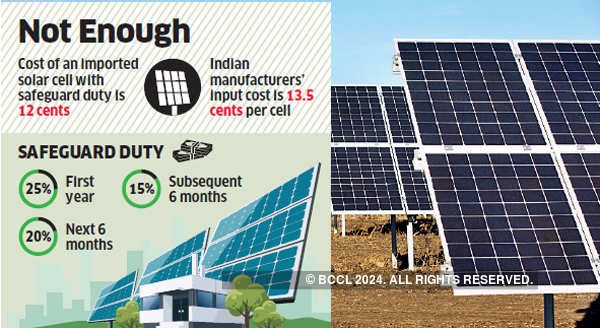The 25% safeguard duty imposed on imported solar components, meant to support domestic manufacturers, has not done cell producers any good, although module makers have fared better.
“We’ve got zero orders since the duty became applicable,” said the chief executive of a solar cell company, requesting anonymity. “Our factory is still shut. We are surviving with great difficulty.” Solar cell manufacturers said even with the duty, their products remained more expensive. They had suggested.
The safeguard duty was set for two years – in any case not more than three – and was expected to spur investment in local solar cell manufacturing, enabling achievement of scale that would help compete with global counterparts. But there have been no new investments. “When you invest in manufacturing capacity, it’s a big investment which is expected to pay off over time. A two-year declining duty is not enough to do that,” said a rooftop developer who did not want to be identified.
However, domestic manufacturers of modules with imported cells have fared better after safeguard duty. Locally made modules cost 25-27 cents per piece and after the imposition of the duty, Chinese modules cost the same.
“Indian module manufacturers are more competitive on price now than they were before the duty came. We source modules from China, South East Asia and India. We find there’s no clear winner on price anymore,” the rooftop developer said.
About 500 MW of solar modules were manufactured in India every quarter, which rose to 650-700 MW after the duty was imposed, according to data collected by solar consultancy Bridge To India.
“Because of exchange rate volatility, many small developers prefer to lock their costs upfront rather than sign their contract in dollars not knowing what they will ultimately have to pay. Hence, the smaller developers now prefer to buy Indian modules,” said Vinay Rustagi, Managing Director of Bridge to India
module manufacturers are still not fully satisfied. “We are optimising our investments, making our modules more competitive, improving the product portfolio, but we are not planning any large investments till the government gets serious about improving the financial situation of the Indian manufacturers,” said Gyanesh Choudhary, chief executive of module manufacturer Vikram Solar.
They also worry the duty has been imposed for too short a period. The commissioning deadline for most auction solar projects in 24 months,

source@economic times 03/01/2019